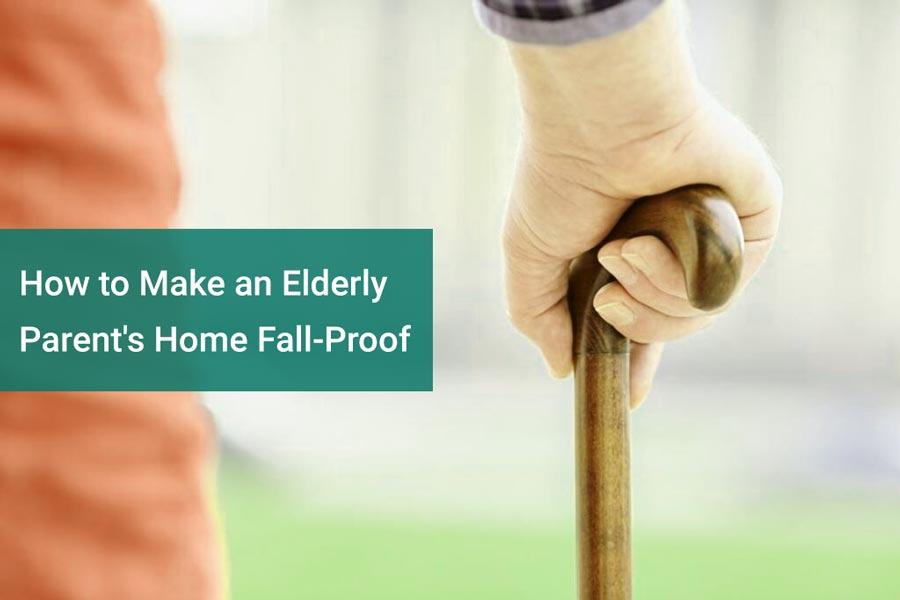Falls are the leading cause of injury for the elderly in America, causing 2.8 million to end up in emergency rooms. If you notice that your parents are no longer able to get around the home without help, it may be time to fall-proof their home to prevent accidents. Falls may cause the loss of an elderly parent’s ability to move around independently, and change the quality of their lives. Making changes around your parent’s home can greatly reduce their risk of falling.
Here are some tips to help you fall-proof your parent’s home.
Start in the Bathroom
About 80 per cent of falls happen in the bathroom. Bathrooms can retain moisture, causing the floors to be slippery and increase the risk of falling for people of any age. Elderly individuals can also fall due to weakness while getting out of the tub or off the toilet. You can make the bathroom safer by installing grab bars in these areas to provide support and stability while moving around. Taller profile toilets or raised toilet seats are also helpful.
Ensure that all the showers and faucets are free of leaks, which contribute to moisture problems in the bathroom. Use non-slip strips for traction on the shower or tub floors, enabling added safety while bathing. If you have available space, consider installing a shower bench.
Floor Traction
If the floors of your elderly parents' home are slippery, they are at a higher risk of suffering a fall with injuries. This is especially true for older adults whose gait changes, causing them to shuffle their feet while walking. You can increase traction on the floor by using anchored carpeting or non-slip rugs on hard floors. Unsecured rugs may move across the floor and cause your elderly parent to fall from loss of balance.
Space and Access
Excess furniture or other clutter may limit the amount of space your elderly parent has to move around. It’s important to get rid of the obstructions or rearrange furniture to free up more space to freely navigate the home.
Ensure frequently used items are easy to access instead of stored away in hard to reach areas. Using a step stool to reach items can create an opportunity to fall. Rearranging cabinets and installing low shelves in pantries may help improve your parent’s access to things they may need without the risk of stepping on a stool.
Proper Lighting
Poor lighting may not illuminate tripping hazards in the home, leading to falling accidents. Ensure that all rooms provide bright lighting, especially in key areas of travel. Supplemental lighting such as night lights or wall-mounted lamps in hallways and bathrooms can help brighten areas that are prone to shadows or dimness.
Secure the Stairs
Your elderly parent could easily fall when trying to ascend or descend stairs. If railings are too wobbly or otherwise don’t provide enough support for them to hold on to, install a sturdier option. Use non-slip strips on stairs for added safety. If eliminating stair use isn’t a possibility, consider stair-assist devices to help your elderly parent travel up and down the stairs.
Check For Uneven Floors
Uneven floors are responsible for many falls and injuries. Older floors may become uneven if the wood is warped or sagging, or if a home’s foundation settles. Carpeting that comes loose and bunches up may also cause unevenness. Check floors regularly to spot any uneven areas and correct it as soon as possible before it causes problems for your parent.
Medical Alert Systems
Falls can still occur even if you’ve done everything to make your parent’s home safer. If a fall does happen, medical alert systems can help your elderly parent get emergency care as soon as possible.
These wearable devices help your parent request help in the event of a fall. Some options have automatic fall sensors that don’t require pressing a button. A contact centre responds promptly, notifies your parent’s emergency contact list, and dispatches the appropriate help to the scene. These devices can be lifesaving in the event of a fall. They also help your parent remain in the comfort of their home without the risk of suffering alone through emergencies.
There are lots of these systems on the market with a wide (and confusing) range of options. To help pick the best system, check a review site to find the best medical alert systems for you.
Caring for an elderly parent can be difficult and stressful. However, following the above tips can reduce the risk of falls and the worry you may have over your parent’s safety.




